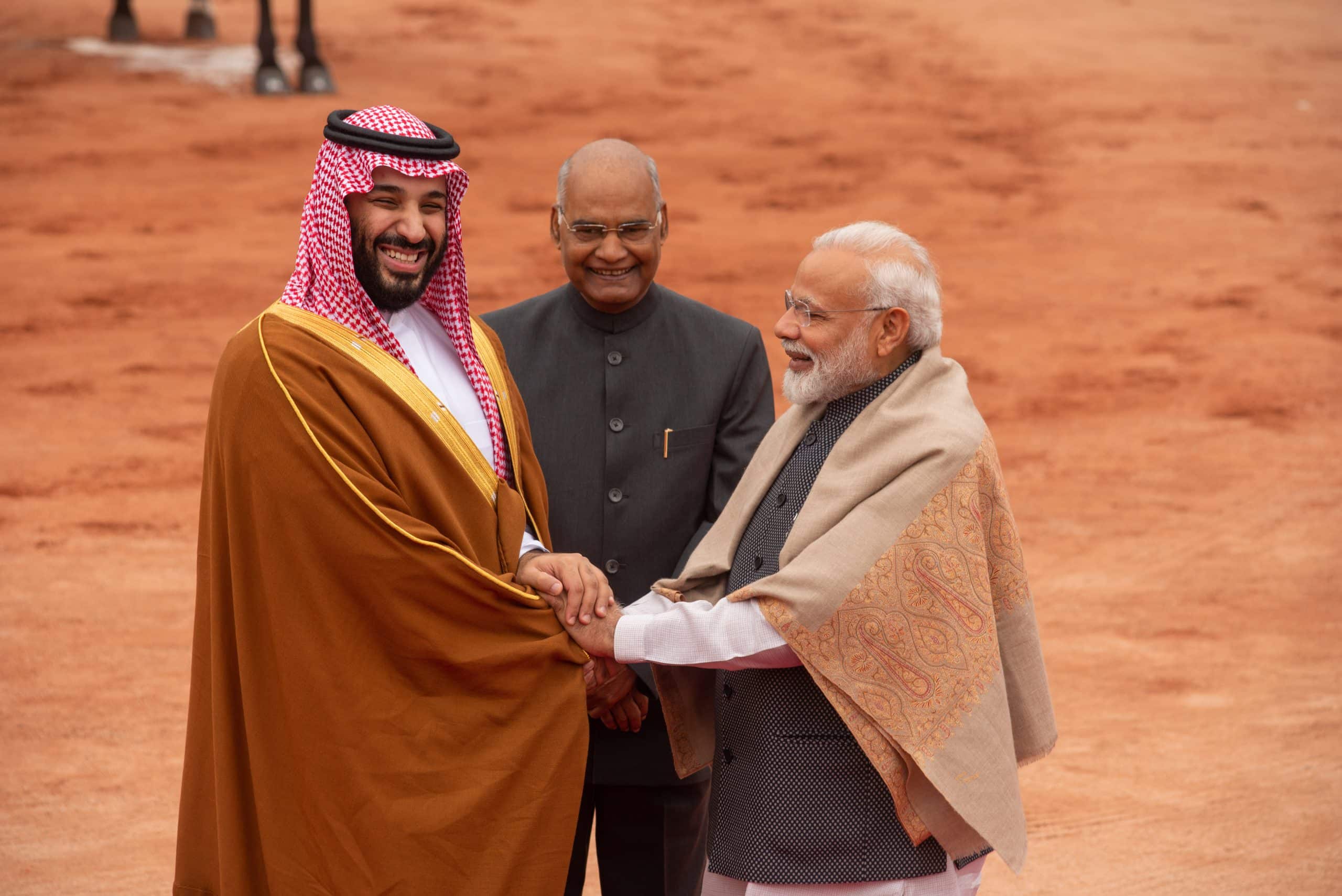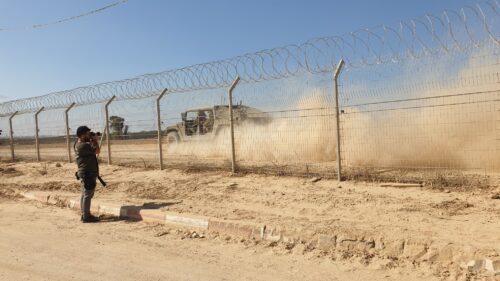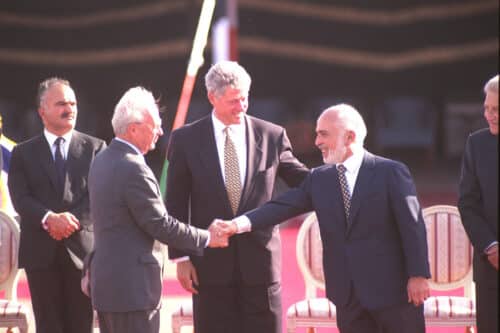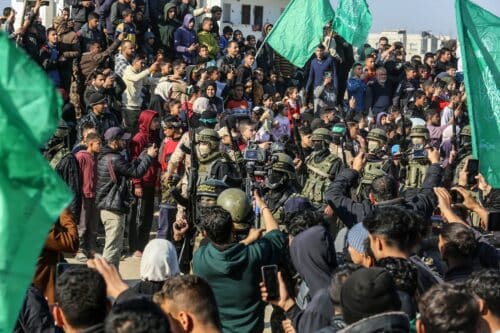
The war in the Gaza Strip has once again placed the “Palestinian Cause” on the global agenda and in particular on the pan-Arab agenda. The moderate Arab countries regard this war as a severe threat to regional peace but they also see this as a vector for a conclusive solution of the “Palestinian Cause”. With this they dovetail with the US administration’s vision of achieving the establishment of a “rejuvenating Palestinian Authority”. This paper presents a set of developments and points out the moves, which according to our sources are now materializing behind the scenes, in favor of the plan for a new architecture of the Palestinian arena. The paper will deal in its first part with the Palestinian Authority. In the second part it will address Hamas. It presents a string of new disclosures, laid out here for the first time.
In early February, the Saudi newspaper Al Majala printed an article describing the hostage release negotiations as part of a far-reaching three-phased plan, where only the first phase deals with the hostage release. The second phase, described as the Diplomatic Phase, covers a set of measures for reviving the peace process between Israel and the Palestinian Authority. The key measure is a set of reforms within the Authority, Western recognition of the Palestinian state, and more. The third phase deals with a strategic agreement between the United States and Saudi Arabia that will enable establishing diplomatic relations between the kingdom and Israel. The roadmap outlined in the Saudi article will also be the subject of this paper.
USA President Joe Biden’s vision of November 2023, which included the reestablishment of a Palestinian Authority that will take over government of the Gaza Strip the day after the war has reinvigorated the Palestinian arena. President Biden defined the principle of “reviving” the Palestinian Authority as the foundation for the two-state solution post-war.
“Gaza and the West Bank need to reconnect in order for a single government structure to be able to contain both these territories under a revitalized Palestinian Authority”, said the President, adding that the United States would continue to work for the two-state solution. Opposing this is the Israeli government, which objects to a return of the Palestinian Authority to Gaza, given that it is supports terrorism, teaches hate, engages in incitement and even payrolls terrorists.
Ever since then, according to a long list of sources in the Palestinian Authority, in Arab countries and in Israel, we have been facing considerable re-architecting efforts on the part of the United States, as one of the senior Palestinian Authority officials put it. This paper will describe the United States’ efforts to alter and reshape the Palestinian arena in preparation for the day after the end of the war in Gaza.
The American Demands from Mahmoud Abbas
As part of its efforts to prepare the Palestinian Authority for rule in the Strip, the United States has laid out a set of preconditions for the Authority, which are intended to transform it into an effective governing authority – so say sources in Ramallah, who include Fatah and Palestinian Authority officials.
The United States National Security Advisor, Jake Sullivan, recently met with the Head of the Palestinian Authority, Mahmoud Abbas. This was one of a long string of meetings in which the United States urged significant reforms in the Palestinian Authority, such that it would become an effective government of the post-war Gaza Strip: radical reforms, streamlining of government apparatuses, etc.
According to Palestinian sources in Ramallah, the United States has been asking Mahmoud Abbas to relinquish a large proportion of his authorities and to appoint a Deputy for Palestinian Authority Matters. The United States furthermore demands a host of structural reforms, the establishment of effective anti-corruption departments and the appointment of a Palestinian technocrat government, to be headed by a Prime Minister who will wield sweeping authority.
Another demand from the Americans – and from the Jordanians and the Egyptians – is that Mahmoud Abbas hold elections, based upon which a Palestinian national unity government will be set up, although it is unclear whether this demand is still a top priority in view of the situation in the Gaza Strip. On March 14, Mahmoud Abbas instructed his close advisor, Muhammad Mustafa, to set up a new technocrat government in accordance with the American dictate (however senior PA officials deny the existence of such a dictate.[1]
Palestinian sources in Ramallah say the United States is demanding Mahmoud Abbas also reform the salary payment to terrorists and prisoners incarcerated in Israeli jails, and to make far-reaching changes to the education system and the schoolbooks, as a condition for transferring the aid money to Ramallah.
The Survey Unsettling Ramallah
According to reports in the Arabic media, Mahmoud Abbas was accommodating toward the Americans, however he also demanded they work to recover the tax moneys frozen by the Israelis.[2] Sources in Ramallah, senior PA officials, confirm that agreement was reached, with American mediation, and that Israel will remit the tax moneys to the Palestinian Authority, that will use it to pay the salaries of its personnel in the Gaza Strip. This will be done after the Authority provides Israel the list of civil servants who will be eligible for a salary.
A source in the Palestinian Ministry of Finance explains that this involves approximately NIS 250 million, of which 70 million are intended as pensions and 180 million are for Palestinian civil servants currently operating under Hamas rule. In an interview, Mahmoud Abbas claimed the amount totals USD 140 million per month.
Other sources in Ramallah have questioned the new American strategy, especially in view of a recent survey, according to which 88% of the Palestinian public is demanding dismantling of the Palestinian Authority and 68% of them regard the Palestinian Authority to be a burden.[3] The survey also found a sharp increase in support for Hamas in Judea and Samaria. It states that if elections were held today, 51% of voters would have supported Hamas while Fatah would have received only 19% of the votes. When asked to choose between Isma’il Haniyeh and Mahmoud Abbas, Haniyeh would have won with 78% while Mahmoud Abbas would only have received 16% of the votes.
Seeking an Alternative to Mahmoud Abbas
According to the Sunday Telegraph, the White House has grave misgivings as to 90-years-old Mahmoud Abbas’s ability to lead the Palestinian Authority through the upcoming challenges in the Gaza Strip. However, Fatah sources explain that the American pressure is not aimed at keeping Mahmoud Abbas in office. Quite the contrary – they state that the USA is seeking a suitable successor for him. Among others, the names of Muhammad Dahlan and Hussein a-Sheikh have been floated.
Senior Palestinians, including Nasser Qidwa, Arafat’s nephew and former Palestinian Authority Ambassador to the UN, recently met with the Qatari Hamas camp in Doha. In anticipation of the post-war era in Gaza, this meeting discussed the possibility of establishing a new Palestinian body, representative of all Palestinians, including Hamas, which is currently not a member of the PLO. For over a year now, Qidwa has been promoting the idea of setting up a “national salvation front” to restore the Palestinian leadership. He is now devoting all his efforts to bringing an end to the war.
Arab countries are promoting a plan, one of whose principles is “No Abbas and No Hamas” for post-war Gaza – a plan that has been gaining traction within the US administration. The moderate Arab countries are not the only ones working on this issue. The Qataris are also involved, and they see eye to eye on many of the points. Muhammad Dahlan, Fatah Leader in Exile, spoke about this in an interview with the New York Times.[4]
This interview is not an isolated incident. Dahlan’s representatives recently met in Doha with Hamas leaders Isma’il Haniyeh, Khaled Mashal and Zaher Jabbarin. Dahlan was represented by Samir Mashharawi and Nasser Qidwa, Arafat’s nephew who was deposed by Mahmoud Abbas and who allied himself with Dahlan.
The talks were intended to discuss Gaza’s future in view of the dangers inherent to the consequences of the war. Dahlan’s representatives tried to gauge the mood within the Hamas Leadership, to get a handle on which direction they are heading. However according to Arab sources, including senior Palestinians, we are told that not all the talks in Doha are quite so cordial and that the Hamas leadership is being subjected to extremely severe criticism due to its responsibility for the current predicament.
From conversations with senior Arab sources, it appears that highly-significant moves are afoot, involving Palestinian political players who belong neither to the Palestinian Authority nor to Hamas. Arab ambassadors, public figures and lobbyists are also promoting these ideas in Washington. They are meeting with senators of all parties and also with Biden’s advisors. It is these moves that have prompted Biden to speak of the need to establish a new Palestinian organization.
Dahlan’s Grand Plan for Ruling the Strip
We are, for the first time, disclosing here the details that can be shared about Muhammad Dahlan’s plan, based on Arab diplomats. Dahlan, the exiled senior Fatah member, who is based in Abu Dhabi, is promoting a grand plan for ruling the Gaza Strip. The plan has already been given a name – Arab diplomats are calling it “The Arab Security Initiative for the Gaza Strip, 2024”.
The plan includes ruling the Strip, as part of a comprehensive political and security settlement, which will include dismantling of the PLO at the end of it, ahead of ending the Israel-Palestine conflict. All this will be done with broad Arab support, including Saudi Arabia, and with the backing of the United States and the British, who believe this could serve as a vector for normalizing relations between Israel and Saudi Arabia, which favors the dismantling of the PLO on the way to a permanent solution in Judea and Samaria and in the Gaza Strip.
This is a three-phased plan. The first phase will see the entry of an Arab army into the Gaza Strip. The second phase will include a technocrat government being set up there and the third phase will install security arrangements, including prevention of arms smuggling and eradication of the entire tunnel-based smuggling industry beneath the Philadelphi Corridor.
As part of the second phase, a provisional government will be set up in the Gaza Strip, which will be backed by the Arab force. This will be a government of technocrats, which will carry out a long list of reforms, including those currently being demanded of the Mahmoud Abbas government by the Americans. That government will only be in charge of civilian life in the Strip until such time as elections will be held.
This government will begin its work concurrently with security activity in the Strip, assisted by the Arab force. The security activity will begin in Rafah and work its way northwards. Talks Dahlan has been holding in recent months with Arab states have resulted in agreement that the Arab army that will be entering the Strip will consist of Egyptian, Jordanian and Moroccan forces, and that it will be financed and backed by the Gulf states plus support from the Arab League. “All of these are already in their advanced stages of discussion”, says an Arab diplomat.
“Rule in Gaza Will Not Necessarily Be Based on the Oslo Process”
Privately, Dahlan wonders what was the Israeli rationale behind launching its maneuver in the north and working southwards. He believes the Egypt-Gaza border should be sealed off first of all, in the Rafah area, and then security should gradually be installed from the south northwards with the help of the Arab army.
“Rule in Gaza will be based on a Palestinian and Arab flag, with Dahlan and the Emirates supporting it remotely. The rule will not necessarily be based on the Oslo Process”, says an Arab diplomat. The leadership in Gaza will be based on local personnel with support from Gulf Arab governments, including Saudis, who will help financially and diplomatically.
Dahlan’s rule in the Gaza Strip will likely be based on a group of Palestinian figures. It will rely on the PLO’s authority until the final phase, at which time the Palestinian umbrella organization will be disbanded. Dahlan is putting forward the name of Nasser Qidwa, his political ally, plus a group of other persons from his inner circle.
Dahlan believes the current Palestinian rule has got to undergo a radical restructuring, and that the future leadership in the Gaza Strip has got to include a very sizable Arab component. He recently laid out the way he perceives the final settlement in the Gaza Strip during an interview with the New York Times, entitled Not Abbas and Not Hamas.
The plan is proceeding and involves signing contracts with megacompanies for rehabilitation of Gaza. It is estimated that the rehabilitation will cost USD 90 billion, as quoted by the Egyptian President.
Dahlan is Channeling Food and Water into the Strip
Dahlan is working on a set of accords with Mohammed Bin Zayed and with Mohammed Bin Salman concerning his plan for the day after. This includes a demand, coming from several Arab countries, to dismantle the PLO, given a political settlement in the Gaza Strip and in Judea and Samaria, according to an Arab diplomat.
Dahlan is fully coordinated with the Saudis who support his plan, and also with the United Arab Emirates that has already begun sending considerable aid to the Gaza Strip and which is also planning to operate the maritime line between Cyprus and the temporary pier under construction in the Strip.
Meanwhile Dahlan himself is sending very considerable aid to the Gaza Strip. One third of the water currently reaching Strip residents come from six desalination plants the United Arab Emirates is building and financing within Gaza Strip territory. In addition, 200 thousand meals are served daily to Gaza residents from the aid Dahlan is sending. Much of the food is acquired with the help of the Emirates. It enters the Strip on Egyptian trucks.
“Dahlan is already paying for the transfer of the trucks in the Gaza Strip through people loyal to him, including armed groups,” say his people. In addition, over 10,000 Gazans have been hospitalized, all paid for by Dahlan, who is also paying for a dedicated burns ward. Sources note that the total investment Dahlan has made in supporting the Gaza Strip residents since October 7 has exceeded USD 400 million. This includes desalination plants, hospital medical care and care for burn victims and also heating and shelters. All this is being done under Operation Birds of Goodness, on which Emirates Leader Mohammed Bin Zayed has embarked.
“Dahlan believes that Hamas ought to be part of this regime since it will never be possible to completely disregard the movement. However, he believes it has got to transform into yet another faction under the PLO,” says a person close to him. He explains that recently, while Dahlan met with Isma’il Haniyeh in Qatar, the two discussed this issue.
“This is a Saudi initiative. It has already received widespread Arab support and it is also supported by the United States and Britain,” according to the Arab diplomat. They, in addition to the Gulf states, believe that dismantling the PLO will serve as the end of claims and end of conflict between Israel and the Palestinians.
The Egyptian Initiative
Egypt is the key player on this matter. In this context it has proposed, as part of the hostage freeing negotiations, an initiative containing the term Technocrat Government.
Mahmoud Abbas rejected it and sent an envoy to Egypt, however in practice such a government is in the process of being set up after Mahmoud Abbas, on March 14, tasked his close aide Muhammad Mustafa with cobbling it together.[5] The term Technocrat Government, claim Palestinian sources, was a message to Mahmoud Abbas as well as to Hamas, indicating that Egypt is interested in a different Palestinian entity, “not Hamas and not Abbas”.
It is no accident, says an Arab source, that both Hamas and the Palestinian Authority have rejected the term Technocrat Government. Although they are now willing to discuss a Palestinian unity government, also under the PLO, the differences between the Qatar camp and the Iran camp in Hamas is still preventing it.
Israel is Maintaining Contact with Palestinian Authority Representatives
Israel, on the other hand, has been toying with several ideas, such as handing over the aid in the Gaza Strip to the clans. Palestinian sources have recently disclosed that Israel even contacted the Palestinian Authority on this matter for assistance in distributing the aid in the Strip.
At the same time, Israel has been in contact with Palestinian and Arab players in Ramallah, Gaza and the Arab countries, examining the feasibility of post-war Palestinian rule over Gaza, and in order for them to assume responsibility for aid distribution in the Strip – this according to official and other sources. This came to the fore due to Hamas’ commandeering the aid entering the Gaza Strip, a situation that is counterproductive in terms of the war’s objectives.
Israel has recently contacted persons within the Palestinian Authority to inquire whether they would assume responsibility for running the day-to-day lives in the Gaza Strip and the aid distribution already in this phase of the war. Israel is also gauging their readiness to take over government of the post-war Strip.
Such contacts were held with senior Palestinian Authority officials and with other Palestinian figures. To this end, a very senior figure in the Israel security forces met with Arab and Palestinian persons in an Arab country. Security authorities in Israel confirmed these moves.
Israel has lately contacted several clans in the Gaza Strip through the Palestinian Intelligence Chief Majed al-Faraj, a close advisor of Mahmoud Abbas, whose name has been mentioned as one of his likely successors. Faraj’s name has recently been mentioned as the person suggested by the Israel security forces to temporarily manage life and food distribution in the Gaza Strip. Yair Lapid, head of the Israeli opposition, said in an interview: “It is quite natural to name Faraj. He’s one of the figures we have worked with most against Hamas.”
Meanwhile it has transpired that Faraj has appointed an officer, ranking brigadier general – a member of the Palestinian General Intelligence – who is already in contact with several clans, particularly in the southern Gaza Strip, inquiring whether they will be able to become a local force capable of providing security for the food convoys on their way to the northern Gaza Strip. The goal is to use them to bypass Hamas, which has been commandeering the aid convoys. Faraj’s representative instructed the clan leaders in Rafah and the southern Strip to prepare for securing the convoys and to make use of local armed people.
Referring to talk about the possibility, which is under consideration by the Israel security forces, of assigning day-to-day life in the Gaza Strip to Faraj, sources close to him are saying: “We are now attending to whatever is necessary to stop the bloodshed and destruction in the Gaza Strip and, before we achieve that goal, there is no point in discussing Gaza’s future.”
Ramallah: Israel Understands the Need to Return the PA to Gaza
Senior officials in Ramallah add that “Israel has already tried the Hamas alternative, which blew up in its face on October 7. There is no readily-available option other than returning the Palestinian Authority to Gaza.” They add: “There is now a realization, shared by us and representatives of the Israel security forces, as to the need to return the Palestinian Authority to the Gaza Strip. However insofar as this applies to the Israeli government, the radical right-wingers object to any such plan.”
Arab sources are reporting that besides the Israel security forces’ approach to Faraj on security matters, Israel has also been in touch with the Palestinian Minister of Civil Affairs, Hussein al-Sheikh, asking him to intercede in favor of aid delivery in the Strip. Al-Sheikh instructed his representative in the Gaza Strip, Iyad Nasser, along these lines. Nasser is the head of the liaison office in the Palestinian Authority’s Ministry of Civil Affairs. Following these instructions, Nasser has chosen five transport companies belonging to Palestinian businessmen, all close to him.
These companies have been approved by the Israel security forces and by the COGAT and have already begun operations in the Strip, assisted by armed groups. The companies transport the food throughout the Strip. In February one of them got involved in an incident in which some one hundred Palestinians were run over in Nabulsi Square in the northern Gaza Strip.
This happened when the convoy of trucks came under Hamas attack while the IDF had been providing security for a different stretch of the convoy’s route. Israeli military sources have also corroborated this. Nasser is the PA’s official representative in the Strip, in his capacity as head of the Palestinian liaison office these past two years. He is al-Sheikh’s personal appointment. Nasser had negotiated with Israel to obtain work permits for the Palestinian laborers who were employed in Israel. Incidentally, he had been arrested several times by Hamas, who are trying to impede the Palestinian Authority’s work in the Strip.
Allegations in Gaza are that the transport companies he operates receive large bribes and that also the Palestinian and Egyptian Red Crescent societies, who sought to transfer aid from Egypt via Rafah, bribed these companies and that they are also responsible for the price rises in the Strip. “Nowadays a gas balloon costs NIS 750, while its original price is only NIS 60,” says a Gazan merchant.
Talk with Arab Countries about the Day After
The talks Israel is holding with senior Palestinians and Arabs are not confined only to aid distribution. Israeli security and diplomatic personnel are holding discussions with Arab and Palestinian persons in Arab countries about the shape the government in the Gaza Strip will assume after the war and about the terms for establishing it.
Several unofficial envoys from Israel have been sent for meetings in Arab countries. A very senior reserve officer has also gone for meetings with Palestinian officials in an Arab country. The senior Israelis were presented with various security-related possibilities and economic options. Another topic of discussion was the cooperation expected between moderate Arab Gulf states and the future regime in the Strip.
Conclusions so far: The PA as a Post-War Government Entity
In summary, there is an intense American drive underway, jointly with Arab countries, including the Abraham Accords member-states, to position the Palestinian Authority as a post-war governing body in the Gaza Strip.
This American drive has two main objectives: the first is to preserve the two-state solution as an option, where the Palestinian Authority would take over control of the Gaza Strip, re-uniting it with Judea and Samaria. The second is due to realization that a ceasefire in the Gaza Strip will also mean quiet on the northern front, lifting the threat of a regional flare-up.
However despite the American and Arabs’ best efforts, it is highly unlikely that the Palestinian Authority, as it currently stands, and given that it is ill-prepared for such a project, will be able to shoulder the task of reconstruction in the Strip, an undertaking that is expected to cost some USD 90 billion. The Palestinian Authority is beset by atrophied systems, including the PLO systems. Its standing among the Palestinian public at large is at an all-time low, and, above and beyond all that, the Fatah, which is the backbone of the Authority, has disintegrated and splintered into several blocs. All this is taking place while Hamas is still showing strength, and has by no means relinquished its role in the Palestinian arena and in the Gaza Strip.
Besides that, among Palestinians the need is also arising to find an alternative to the malfunctioning Palestinian Authority. It appears that for this reason Mahmoud Abbas has decided to oversee a set of cosmetic reforms, which will enable the Americans to accept the Palestinian Authority as a new entity in the Gaza Strip.
To this end Mahmoud Abbas has recently appointed new governors. He has even ordered the setting up of the next government – a technocrat government – one of whose main tasks will be reconstruction of the Gaza Strip – according to Muhammad Mustafa, who is designated to head it. Meanwhile the United States is constructing a temporary pier in Gaza Strip territory, while Hamas is working to flesh out its ranks while the tribal and clan leaderships are steadfast in rejecting any idea reminiscent of the “Village Associations”.
The views expressed in this article are those of the author and do not necessarily represent the views of the movement
[1] See the article in the Alquds Website.
[2] See the Wattan website.
[3] See the article in the PSR Website.
[4] See the article on the Sky News website.
[5] See the article in Al Jazeera.






